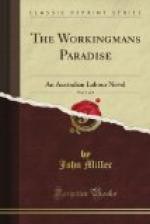“God!” she answered, scornfully. “There is no God. How can there be?”
“I do not know. It is as one feels. I do not mean that petty god of creeds and religions, the feeble image that coarse hands have made from vague glimpses caught by those who were indeed inspired. I mean the total force, the imperishable breath, of the universe. And of that breath, my child, you and I and all things are part.”
Stratton took his cigar from his mouth and quoted:
“’I am the breath of the lute, I am the mind of man, Gold’s glitter, the light of the diamond and the sea-pearl’s lustre wan. I am both good and evil, the deed and the deed’s intent—Temptation, victim, sinner, crime, pardon and punishment.’”
“Yes,” said Geisner; “that and more. Brahma and more than Brahma. What Prince Buddha thought out too. What Jesus the Carpenter dimly recognised. Not only Force, but Purpose, or what for lack of better terms we call Purpose, in it all.”
“And that Purpose; what is it?” Ned was surprised to hear his own voice uttering his thought.
“Who shall say? There are moments, a few moments, when one seems to feel what it is, moments when one stands face to face with the universal Life and realises wordlessly what it means.” Geisner spoke with grave solemnity. The others, hardly breathing, understood how this man had thought these things out.
“When one is in anguish and sorrow unendurable. When one has seen one’s soul stripped naked and laid bare, with all its black abysses and unnatural sins; the brutishness that is in each man’s heart known and understood—the cowardice, the treachery, the villainy, the lust. When one knows oneself in others, and sinks into a mist of despair, hopeless and heart-wrung, then come the temptations, as the prophets call them, the miserable ambitions dressed as angels of light, the religions which have become more drugged pain-lullers, the desire to suppress thought altogether, to end life, to stupefy one’s soul with bodily pain, with mental activity. And if,” he added slowly, “if one’s pain is for others more than for oneself, if in one’s heart Humanity has lodged itself, then it may be that one shall feel and know. And from that time you never doubt God. You may doubt yourself but never that all things work together for good.”
“I do not see it,” cried Nellie.
“Hush!” said Connie. “Go on, Geisner.”
“To me,” the little man went on, as if talking rather to himself than to the others. “To me the Purpose of Life is self-consciousness, the total Purpose I mean. God seeking to know God. Eternal Force one immeasurable Thought. Humanity the developing consciousness of the little fragment of the universe within our ken. Art, the expression of that consciousness, the outward manifestation of the effort to solve the problem of Life. Genius, the power of expressing in some way or other what many thought but could not articulate. I do not mean to be dogmatic. Words fail us to define our meaning when we speak of these things. Any quibbler can twist the meaning of words, while only those who think the thought can understand. That is why one does not speak much of them. Perhaps we should speak of them more.”




